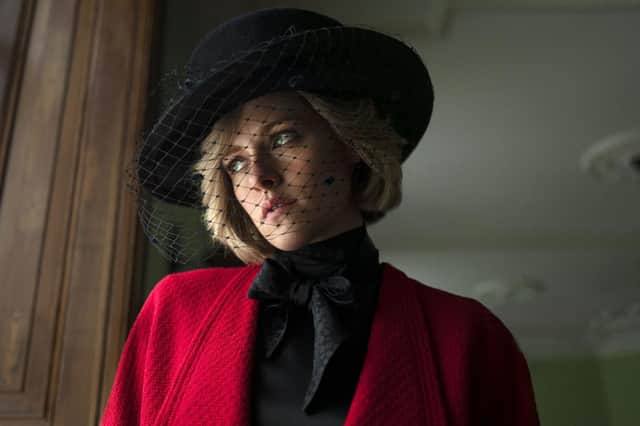Why the fictional portrayal of Princess Diana by Kristen Stewart in Spencer feels like the truth - Anthony Clavane


In his seminal book Into The Woods, he examined the narratives of such classics as Beowulf, The Godfather and those never-ending TV soaps which absorb millions of viewers.
Princess Diana’s life, he noted, is remembered in mythic fashion.
Advertisement
Hide AdAdvertisement
Hide Ad“In the late 80s and early 90s,” he wrote, “when the Royal family seemed to be imploding, the Windsor soap became compulsive viewing.”
Almost a quarter of a century has elapsed since Diana died. And yet, here we are, still obsessed with her story. Or should I say stories.
If the past decade is anything to go by, they remain as indispensable as ever.
They rank from the ridiculous – Oliver Hirschbiegel’s hackneyed 2013 film Diana and Netflix’s unintentional parody Diana: The Musical – to the really rather good.
Advertisement
Hide AdAdvertisement
Hide AdI would include The Crown in the latter category. Season four gave us Emma Corrin’s interpretation, a huge improvement on Naomi Watts’ forgettable portrayal of eight years ago, and there are high hopes for Elizabeth Debicki’s early-to-mid 1990s’ version in next year’s fifth series.
The news broke a few days ago that Jemima Khan, a friend of the princess, had given up her consulting role on that series. Khan believed the story was not being handled “as respectfully or compassionately” as she had hoped.
I read this as I emerged from the cinema following a viewing of Spencer, a captivating new biopic of Diana, starring Kristen Stewart.
Up until The Crown, I hardly gave her a thought. I wore a jokey “Don’t do it Di” badge when she married Prince Charles in 1981 – I was a student at Sussex University at the time, and such pretentious gestures were de rigueur – and can remember being called into my newspaper’s office to write an obituary following her shocking death in 1997.
Advertisement
Hide AdAdvertisement
Hide AdOther than that, I failed to comprehend what all the fuss was about.
I am not a great fan of the hype surrounding the Royal family, although I find the continuing fascination with Diana to be really interesting.
There is no doubt that she was, at one point, the most famous woman on the planet. She was also, quite possibly, among the most troubled.
Spencer has been attacked, like The Crown, for playing fast and loose with the truth.
Advertisement
Hide AdAdvertisement
Hide AdYet its director Pablo Larraín makes no bones about it being a semi-fictional interpretation of a troubled woman trapped in an unhappy marriage.
I would go even further and call her a wronged woman. There are always two sides to any story, especially ones involving the disintegration of a marriage, and as a journalist back in the 1990s I was well aware of the spin-doctoring, leaking and factual manipulation emerging from both camps.
The events of Spencer take place over three days at Sandringham, from Christmas Eve to Boxing Day, in 1991. Thirty years later, in a movie told entirely from Diana’s perspective, Larrain is obviously on the side of the People’s Princess.
Of course, just as Khan has taken The Crown to task, so the film’s factual accuracy has been criticised.
Advertisement
Hide AdAdvertisement
Hide AdI tend to agree with George Bernard Shaw’s view that there is, sometimes, a greater truth in a fictional account than a factual one.
“Only through fiction,” Shaw argued, “are facts intelligible”. This is known as the narrative fallacy.
Spencer bills itself as “a fable from a true tragedy”. Perhaps I have been swayed too much by Stewart’s spellbinding portrayal of a free-spirited Diana, trapped in an overtly-hostile world: a woman under siege. But Larrain’s take feels, to me, remarkably truthful.
In an insightful piece published recently by the online US magazine Slate, Ellin Stein noted: “Ordinary divorcing couples may compete for custody of the children, friends, and dog, but the Waleses were also wrestling over who would come off best in the court of public opinion.”
Yorke tells me he is working on a new book. I wouldn’t be surprised if he devoted a whole chapter to the narrative structure of a story which continues to obsess the world.
